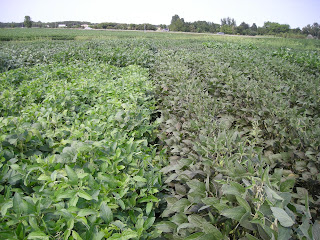Host plant resistance for soybean aphid is the newest management tool for farmers. In small plot evaluations of the
Rag1 gene, there was a dramatic decrease in the seasonal accumulation of soybean aphid compared to susceptible varieties. The entomology department at Iowa State University recently released a new publication,
Soybean aphid-resistant varieties for Iowa, that lists currently available soybean seed with resistance to soybean aphid. The list is intended to assist farmers wanting to adopt this new management tactic for soybean aphid.
The publication also contains Iowa State University recommendations for considering soybean aphid-resistant varieties. For more information on soybean aphid management consult: Soybean Aphid Management Field Guide 2nd edition. Additional information about insecticides is found in the most recent soybean aphid insecticide efficacy evaluation.
Small plot research shows the benefit of host plant resistance. Note susceptible plants (right) are covered with sooty mold that developed on aphid honeydew.




No comments:
Post a Comment
Note: Only a member of this blog may post a comment.